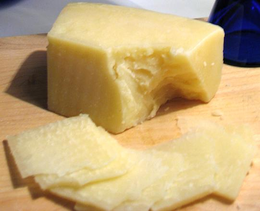Pecorino
| Pecorino | |
|---|---|
 |
|
| Country of origin | Italy |
| Region, town | a |
| Source of milk | Sheep |
| Texture | Hard |
Pecorino is the name of a family of hard Italian cheeses made from ewe's milk. The word derives from Italian pecora meaning ‘sheep’, which in turn is from the Latin pecus meaning .
Of the six main varieties of Pecorino, all of which have Protected Designation of Origin (PDO) status under European Union law, Pecorino Romano is probably the best known outside Italy, especially in the United States, which has been an important export market for the cheese since the 19th century. Most Pecorino is produced on the island of Sardinia, though its production is also allowed in Lazio and in the Tuscan Provinces of Grosseto and Siena. Ancient Roman authors wrote about this cheese and its production technique.
The other five mature PDO cheeses are the Pecorino Sardo from Sardinia, Pecorino Toscano, whose production was already attested by Pliny the Elder in his Natural History,Pecorino Siciliano (or Picurinu Sicilianu in Sicilian) from Sicily, Pecorino di Filiano from Basilicata and Pecorino Crotonese from Crotone in Calabria.
All come in a variety of styles depending on how long they have been aged. The more matured cheeses, referred to as stagionato ("seasoned" or "aged" ), are harder but still crumbly in texture and have decidedly buttery and nutty flavours. The other two types semi-stagionato and fresco have a softer texture and milder cream and milk tastes.
...
Wikipedia
